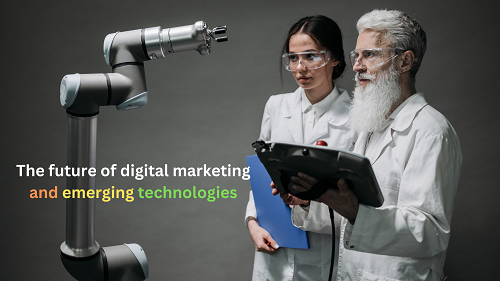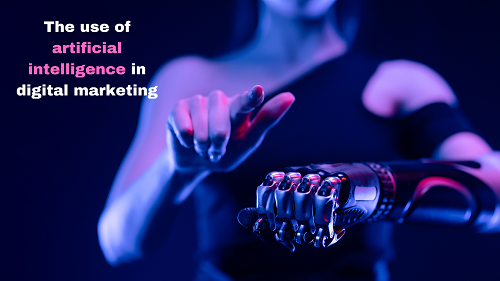Introduction to the future of digital marketing
The future of Digital Marketing is always evolving as new technologies are developed. Here are some of the most promising emerging technologies that are sure to have a big impact on digital marketing in the future:
1. Virtual Reality (VR)
Virtual reality technology is becoming more and more realistic, and it is being used in more and more industries. Marketers can now use VR to create immersive experiences for their customers. For example, you could allow potential customers to try out your product before they buy it, or take them on a virtual tour of your store or factory. The possibilities are endless!
2. Augmented Reality (AR)
Augmented reality is similar to virtual reality, but instead of creating a completely artificial environment, it enhances the real world with computer-generated images and information. This technology has huge potential for marketers, as it can be used to create interactive experiences for customers. For example, you could use AR to give customers real-time information about products they’re interested in, or provide them with interactive guides during store visits.
3. Artificial Intelligence (AI)
AI is already being used by marketers to automate tasks such as social media monitoring and email marketing. However, this is just the beginning! In the future, AI will become even more sophisticated and will be able to handle even more complex tasks such as content creation, customer segmentation, and personalization. This means that marketers will be able to focus on strategy and leave the day-to-
The rise of artificial intelligence (AI) in marketing
Artificial intelligence (AI) is already having a major impact on marketing, and its use is only going to grow in the future. With AI, businesses can automate many marketing tasks, including email marketing, social media marketing, and targeted advertising. AI can also help businesses to better understand their customers and what they want.
As more businesses adopt AI, it will become increasingly important for marketers to understand how to use it effectively. Those who don’t may find themselves at a disadvantage.
The impact of 5G on marketing
The deployment of 5G will have a major impact on marketing. For one, 5G will enable marketers to connect with consumers in real time and at a much higher speed than ever before. This new connectivity will allow marketers to send highly targeted messages to consumers based on their current location, shopping habits, and even the weather. Additionally, 5G will provide marketers with access to new data and insights that can be used to improve marketing campaigns and strategies. Finally, 5G will enable marketers to create more immersive and interactive experiences for consumers, such as virtual reality and augmented reality.
The role of virtual reality (VR) and augmented reality (AR) in marketing
Virtual reality (VR) and augmented reality (AR) are two emerging technologies that are beginning to have a significant impact on marketing. While VR is still in its early stages of development, AR is already being used by businesses to create more immersive and interactive experiences for consumers.
Some of the ways that VR and AR are being used in marketing include: product demonstrations, event marketing, brand experiences, and even advertising. For example, businesses can use VR to give potential customers a virtual tour of their products or facilities. Or, they can use AR to create an interactive experience for customers at events such as trade shows or product launches.
As these technologies continue to develop, it’s likely that we’ll see even more innovative and effective uses of VR and AR in marketing. Ultimately, these technologies have the potential to change the way we interact with brands and make decisions about purchases.
The power of micro-influencers
The power of micro-influencers is often underestimated. With the advent of social media, anyone can be an influencer and reach a large audience. However, micro-influencers have a more intimate relationship with their followers and are more trusted.
Micro-influencers can be very effective in promoting products and services. They have the ability to reach a targeted audience and influence their purchasing decisions.
In a world where consumers are bombarded with advertising messages, micro-influencers can cut through the clutter and get your message across. They can help you build brand awareness and create a positive association with your brand.
If you’re looking to tap into the power of micro-influencers, consider working with them to promote your business or product. You may be surprised at the results you achieve.
How to future-proof your digital marketing strategy
As consumers increasingly turn to digital channels for their shopping, entertainment, and social needs, businesses must follow suit and adopt digital marketing strategies to remain competitive. But with the rapid pace of change in the digital landscape, how can businesses keep up?
Here are four tips to future-proof your digital marketing strategy:
1. Keep your finger on the pulse of change
To stay ahead of the curve, you need to be aware of the latest trends and technologies emerging in the digital marketing landscape. This means regularly reading industry news and blogs, attending relevant conferences and webinars, and following thought leaders on social media.
2. Experiment with new channels and tactics
Don’t be afraid to experiment with new digital marketing channels and tactics. Try out new platforms like Snapchat or live-streaming video, or test out new strategies like influencer marketing or account-based marketing. By trying new things, you’ll be able to better understand what works for your business and what doesn’t – giving you a leg up on the competition.
3. Make data-driven decisions
In today’s data-rich environment, there’s no excuse for making decisions based on gut feel alone. Use data analytics to inform your decision-making around which channels to use, what content to produce, and who to target. This way you can ensure that your efforts are focused on activities that will actually drive results.
Emerging technologies and their impact on digital marketing
Digital marketing is constantly evolving as new technologies emerge. Here are some of the most impactful emerging technologies and how they are changing digital marketing:
1. Artificial intelligence (AI) is being used more and more to personalize user experiences and target ads. For example, Facebook’s ad targeting system uses AI to show users ads that are relevant to their interests.
2. Virtual reality (VR) and augmented reality (AR) are becoming more popular, especially in the gaming industry. This technology is also being used for marketing purposes, such as giving potential customers a virtual tour of a product or service.
3. Voice search is becoming increasingly popular as people use voice assistants like Siri and Alexa to search the internet. This means that businesses need to optimize their content for voice search keywords in order to be found by potential customers.
4. Blockchain is a distributed database that allows for secure, transparent transactions. This technology is often used for cryptocurrency, but it has many other potential applications in digital marketing, such as supply chain management and data security.
5. The Internet of Things (IoT) refers to the growing network of interconnected devices, including everything from cars to home appliances. IoT provides marketers with new data sources and opportunities for targeted marketing campaigns.
Conclusion
Digital marketing is constantly evolving and it is important to stay up-to-date with the latest technologies in order to remain competitive. As emerging technologies continue to develop, marketers must be prepared to adopt and integrate these new tools into their digital strategies for more effective results. In addition, businesses should also ensure that they are staying abreast of consumer trends in order to better understand customer needs and create campaigns that will resonate best with them. By leveraging the power of the internet, businesses can reach a wider audience and increase their market share significantly.
Also Read:






